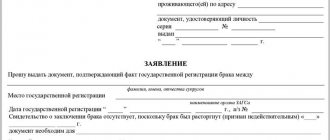What if he doesn't mind?
Even if a man tells you that he doesn’t care, that he doesn’t mind, don’t believe it. Look into his eyes and you will see the pain there. After all, by rejecting his last name, you are also rejecting a certain part of your man.
I see men who have different surnames with their wives. I see families where children have different surnames. Girls - mother's, sons - father's. Or vice versa. And I see how difficult this makes their life.
It is difficult to explain to everyone - a doctor, a teacher, an acquaintance - that this is your child, although he has a different last name. It is difficult for a man to answer the question - why does his wife still have her maiden name? It is almost impossible for a woman with a maiden name to become a wife in the full sense of the word.
When we submitted an application to the registry office, I cherished the hope of keeping my last name (I repent). My husband answered me simply - you can keep your last name, but then you won’t marry him.
This sobered me up. Straightaway. Instantly. And I have never regretted becoming Valyaeva. Are you ready to completely trust and surrender to your spouse? And start from the first step - with his last name?
Where did the tradition of changing your last name after marriage come from?
Many centuries ago, surnames as such did not exist; nicknames were attached to names, usually reflecting the occupation of men.
Ivan the blacksmith, Vasily the hunter, Fedot the archer, etc. It also happened that the nickname became some kind of physical defect or character trait - bully, stutterer, lame, etc.
Women who got married and children received something similar to the surname. Initially it sounded like this: Matryona, Fedor’s wife, or for short – Matryona Fedorova.
If a man was successful and famous in his business, then his professional nickname became the prefix - Akulina, the blacksmith's wife, or Akulina Kuznetsova for short. If the flaw or character trait was very striking, then the woman could turn out to be, for example, Marya Zaikina.
The tradition of taking a husband's surname came from early Christianity, but it was not obligatory for everyone. It was believed that the wife, taking her husband's surname, thereby expressed special respect for the betrothed's family.
During the period of the formation of serfdom in Rus', landowners took advantage of their position and assigned surnames to serfs, and also married off serf girls with a change of surname. This made it more convenient to control and keep records of their peasants.
As for free people and artisans, their surnames reflected the essence of the profession, place of residence, father’s name, possible imperfections, deformities, features, nicknames, nicknames and other signs.
Choosing and changing a surname when registering a marriage
According to the provisions of Article 32 of the RF IC, spouses can choose the surname of one of the parties after registering the marriage, keep theirs, or join.
The latter is not allowed if one of the spouses had a double marriage before marriage. The change of personal data is provided for by Federal Law-143 “On Acts of Civil Status”. In particular, information about this is present in Articles 58-63 and Article 19 of the Civil Code of the Russian Federation.
A change of surname by one of the parties does not automatically entail a change by the other party. Therefore, it is sometimes different for spouses.
It is worth noting that the law provides for the change of personal data not only as a result of marriage. This can be done at any time by writing a corresponding application to the registry office.
If marriage occurs before the age of 18, then parental consent must be provided to register the relationship. Permission to change personal data must also be in this agreement. If the newlyweds don't like their last names, they can take a completely new one. To do this, it is enough to indicate the relevant information when writing the application for marriage registration.
You need to choose it consciously. If both parties have one or more companies, then changing personal data can be a rather complicated process. It will be necessary to change the constituent documents of each company, providing the relevant information to government agencies and banks where current accounts are opened. Therefore, many decide to leave everything as it was before marriage. But having different surnames gives rise to other problems.
With the birth of common children, you will have to prove your relationship to all budgetary organizations in order to receive services. In particular, this applies to registration at a kindergarten, school, registration at a clinic, and so on.
You will need to have with you as evidence the child’s birth certificate and the following documents:
- passport with a note about relationship;
- Marriage certificate.
To avoid these problems, spouses should have a common surname. It is better to replace documents once than to prove kinship for 18 years when receiving public services. This will also greatly facilitate the process of a child receiving an inheritance after the death of their parents.
The decision-making process on choosing a surname should be voluntary. The newlyweds indicate their will in the application for marriage registration, certifying it with their signatures.
Should I change my last name after marriage?
What happens when a wife does not want to take her husband's surname?
• Showing disrespect for your spouse. Women, wanting stability and comfort, want a stamp in their passport and official status, although a man feels good in a civil marriage. If he goes to get married, this speaks of his love, then why is a woman not ready to give up her last name for the sake of her husband?
• Women do not want to change their last name twice, because this will have to be done not only after marriage, but also during divorce. It turns out that the divorce process is a program embedded in a woman’s head, so the girl insists on preserving “herself.”
• A woman does not want to join her husband’s family, because historically, if a woman gets married, she leaves her family and finds a new one. Now everything is happening the other way around: a woman does not want to join her husband’s family, but wants to bring him into her family.
And yet the family is a single whole!
No one has canceled such concepts as traditional values of marriage and family. And if American society is characterized by an extremely simple and democratic attitude towards marriage issues, then our mentality is not like that. The man is traditionally considered the head of the family, and the woman is the keeper of the hearth. Many married couples live according to this model of behavior and are convinced that this is inherent in nature, and no progress can change this order of things.
Besides, it's customary. By taking her husband's surname, a woman protects herself from condemnation and misunderstanding from society, especially when a child is born in the family. A young mother who kept her last name after the wedding should be prepared for not entirely correct questions from teachers or other parents in a child care institution. This is our mentality!
Family code. Statistics in other countries
According to Art. 32 of the Family Code of the Russian Federation, spouses, at their own discretion, choose, upon marriage, the surname of one of them as a common surname, or each of the spouses retains their premarital surname, or, unless otherwise provided by the laws of the constituent entities of the Russian Federation, adds the surname of the other spouse to their surname.
And although recently the number of women who did not want to part with their last name after marriage has been growing, the majority still take their husband’s last name (80%). In this regard, we have a fairly traditional country. Society in the USA, Australia, New Zealand, Great Britain, and France is also conservative. There, the reluctance to take the spouse's surname is a deviation from the rules. In Scandinavian countries, married women are increasingly acquiring a double surname or leaving their own. But in Iceland, changing your last name for reasons such as marriage is generally not accepted.
There is an opinion that a wife who takes her husband’s surname automatically takes on the karma of his family, their energy. For some, changing a surname is tantamount to a loss of individuality, but for others it is luck!
A college teacher conducts a roll call in a new group consisting of young, mature girls: - Ivanova! - I... - Petrova! - I... etc. - How... how... Kakushkina?! The embarrassed young lady gets up and sadly mumbles her “I”... He sympathetically tries to cheer her up: - Well, it’s okay... You’ll get married... The young lady sobs hopelessly: - I’m already out...
How do you feel about changing your last name?
Should I take my husband's surname: pros and cons
Whether to take your husband's last name is a question that has only become debated in the last few decades.
Back in the first half of the 20th century, there was nothing to discuss: of course, take it, what options could there be? Then, with a change in public sentiment, when women began to emerge from the shadow of men, make careers, and gain financial independence, changing their surname upon marriage lost its obligation. It turned out that changing your last name can be discussed, asking the question “do I need it.” And when the girls began to ask themselves this question, it turned out that it was full of all sorts of “buts.” Husband's dissonant surname. Paperwork in the process of changing the “sign”. Finally, she likes hers and doesn’t like her husband’s. So what should we do? And another subtlety. It’s embarrassing to even think about, but my best friend divorced with a bang, a roar and a scandal, so what? She still bears the name of her once ex-husband. Because changing it back is a terrible hassle, a lot of time, which, of course, she doesn’t have.
LIVE
It’s stupid, of course, to think that the husband’s surname somehow influences a marriage - in the sense that it’s not a matter of form, but of content. She took it, she didn’t take it, it won’t make the marriage better or worse. Or will it become? While the bride and five minutes before the wife is thinking, He enters the arena. That almost husband. He nods, listening to gentle arguments, and even, perhaps, accepts and understands these arguments. And it is possible that the question “You weren’t offended?” wisely replies, “No, of course not.” But the feeling that tension has arisen between you does not go away. It seems like such nonsense - well, really, what does your marriage and just some last name, your husband’s or yours, have to do with it. But there seems to be a connection.
TAKE NOT LEAVE
As psychologists say, a refusal to take a husband’s surname is perceived by the latter as a reluctance to become part of his life, or more precisely, to become part of a whole called family. Don't take your last name? This means that you don’t see a future together, you’re not sure about something, you don’t feel like you’re in a single bond with him. Obviously, not all men think this way... although, honestly, who knows. It is possible that even the most advanced man will be forced to work on himself in order to make such a decision for his future wife. Whether to take her husband's surname or leave her surname - these two options, like “execute cannot be pardoned,” turn into an intolerable conundrum for those brides who are trying to find a balance between the reluctance (explained or inexplicable) to give up their “sign” and the reluctance to upset their loved one . Is it my selfishness or is this how I feel? Having agreed - for the sake of my husband - to change my last name, will I act wisely or will I betray myself?
ADVANTAGES AND DISADVANTAGES
It's all complicated. But there will be a way out. You can take a double surname. You can - if you don’t mind running through the authorities later - wait to change, that is, get married, but don’t change your last name yet. Then, perhaps, something will mature, be understood, and then the decision will be made finally. There are many advantages of changing your last name: there will be no difficulties with your children as to who to “register” them with, and in the eyes of society you will be a single whole (which is also important). However, those who still cannot step over themselves and change their last name do not need to reflect and reproach themselves. If you are making a career, and your – exactly your – last name already means something, why lose your “brand”? That's right, there's no need. And even if you are just starting to climb your career and, for example, it is more comfortable for you to go up under your own last name than bad?
EVERY THIRD
Sociologists, by the way, note that keeping a surname is usually the prerogative of independent women who clearly know themselves and their aspirations, and are able to explain their personal attitudes to others. It is not surprising in this regard the results of surveys showing that women who keep their maiden name find work more easily, achieve better success and earn more. Of course, this does not mean that adherents of traditional values are less successful, far from it. But the world is changing, and what was previously undeniable is now becoming a topic of debate. Just 40 years ago, only 9% of women did not take their husband’s surname; today this figure is 30%. That is, almost every third. And it is not a fact that the marriages that these 30% entered into are under threat. After all, if she refused to change her last name and got married anyway, it means that her other half accepted her position. Which is already, to a certain extent, a sign of unity of souls, mutual understanding and the ability to make compromises.
Original article:
Is it worth changing or not: pros and cons
A woman’s change of data is traditionally perceived as the wife’s entry into her husband’s family. Initially, it was accepted that the husband brought his wife into his home, and not vice versa.
However, in modern families that live separately from relatives, this tradition no longer plays a special role, although it probably still lives on subconsciously. It must be taken into account that in a marriage a woman will definitely give birth to children who will be recorded under her husband’s last name, and it will be much more convenient if the mother and children have the same last name.
A woman’s reluctance usually no longer plays a role in the relationship of a couple in love and is not perceived as an insult or a woman’s desire to show her self-sufficiency. Most couples take this issue calmly.
The only point is that this may cause some bewilderment among older relatives - the husband's parents, who may be perplexed about this, but, as a rule, this conflict rarely spreads, because, as mentioned above, young couples for the most part live separately and They try not to depend on their parents.
As for documents, a woman’s desire to leave her last name can save her from unnecessary hassle associated with re-issuing a passport, insurance, rights, making changes to the work book and other documents.
Where to contact?
To change your last name, you must contact the registry office at your place of registration. As a rule, this is easy to do if there are no children together yet.
If you already have children, you will simply have to collect more documents, and the procedure will be more expensive. You can submit an application to the MFC - there the change of name will take longer, because all collected documents and applications will be sent to the registry office.
From what moment are personal data considered changed upon marriage?
According to current legislation, personal data is considered changed from the moment of marriage. The marriage certificate contains the new full names of the spouses or one of them. Information in the new identity document is entered on the basis of the marriage certificate. Without it, specialists cannot indicate new full names.
It is impossible to use the previous passport, as it loses legal force. Therefore, it is necessary to submit an application for a new passport as soon as possible, as well as to change the data in the house register, work record book, compulsory medical insurance policy, driver’s license, international passport, and so on.
In some cases, it is possible to submit an application to change your last name online or through the MFC. If the papers are submitted to the MFC, then you can fill out several applications at once to receive the required documents in one place.











